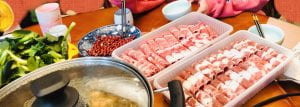General Information about Item:
- Genre: Material Lore – dish; Customary Lore – celebration, belief, superstition
- Language: English with some Chinese (Mandarin)
- Country of Origin: China
- Informant: X.L.
- Date Collected: November 23, 2020
Informant Data:
- X.L. is a 21-year-old senior studying art history at Xi’an Academy of Fine Arts. She currently lives in Shanxi province, China, which is in the northwest part of China. She grew up in the southern part of China. Therefore, she understands how people celebrate the Chinese New Year in different areas of China. She celebrated the Chinese New Year every year with her family in the South and with her friends in Shanxi province.
Contextual Data:
- Cultural Context: There are several reasons that lamb is eaten during the Chinese New Year. First of all, the word “lamb” (羊) in Chinese has auspicious meanings. Lamb in Chinese is pronounced as “yáng” (羊), and many auspicious words are related to it. For example, “sān yáng kāi tài” (三羊开泰), which means the New Year ushers in renewal and a change of fortune. Chinese people always say: “Three yangs bring bliss” or “three yangs meet bliss,” as blessing words at the beginning of a year. Another phrase is “xǐ qì yáng yáng” (喜气洋洋), which means be bursting with happiness. Additionally, in ancient China, the word “羊” is the same as “祥,” which means good fortune. Lamb is eaten also because according to traditional Chinese medicine eating lamb can help people better resist the coldness in winter. Lamb also represents prosperity and wealth in some sense since in the Agricultural Age the number of lambs is closely related to wealth.
- Social Context: Lamb is eaten often on the Chinese New Year’s Eve when all the family members are gathered together at home. Lamb is often cooked and shared among all the family members.
Item:
- Lamb is commonly eaten for the Chinese New Year because of its auspicious name and the fact that lamb can warm up our body in winter. Lamb is eaten almost in all areas of China, but in different areas of China, different types of lamb are eaten, and they are often cooked in different ways, such as grilled lamb, lamb soup, braised lamb, lamb hotpot, etc.
Image file:
Transcript of Interview Clip:
S.T. (collector): What is one of the most interesting or important dishes that is eaten during the Chinese New Year in your family?
X.L. (informant): My family likes to eat braised lamb. It is a big dish that requires a lot of time to cook. Therefore, we only eat it at big festivals, such as the Chinese New Year. It is like the Chinese New Year to us is a very important festival, so we cook the most delicious and most time-consuming dish to show that we treat this festival carefully.
S.T.: Why does your family like to eat braised lamb during the Chinese New Year?
X.L.: My family has the tradition of eating braised lamb in the winter because eating lamb can warm up our body. So, the Chinese new year is just a perfect time to eat lamb since it is the coldest time of the year.
S.T.: Is there any good meaning associated with this dish? Any good hope behind it? Like you know fish is associated with wealth.
X.L.: There is a Chinese proverb called “sān yáng kāi tài” (三羊开泰). It is a very auspicious word and basically means a good start. This is what I can think of now, but I am sure that there are many other auspicious words related to lamb.
Informant’s Comments:
- The braised lamb is considered a “big” dish, which needs to be cooked very carefully for like 2 hours. Everyone has to eat at least a piece to warm up and to gain good fortune.
Collector’s Comments:
- For the Chinese New Year, my family also eats braised lamb for similar reasons as the informant. The kind of lamb we eat is Hu sheep, which is usually cooked with braising. In other areas of Chinese, people may eat different kinds of lamb or even goats, and they are often grilled or made with soup. Eating lamb is both homeopathic magic and contagious magic. The fact that lamb brings good fortune because the word “羊” resembles “祥” is an example of homeopathic magic, and the fact lamb brings wealth because it is a part of people’s property is an example of contagious magic.
Collector’s Name: Stela (Yunjin) Tong

